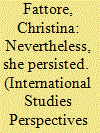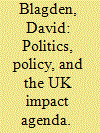|
|
|
Sort Order |
|
|
|
Items / Page
|
|
|
|
|
|
|
| Srl | Item |
| 1 |
ID:
164641


|
|
|
|
|
| Summary/Abstract |
Public diplomacy (PD) lacks an agreed-upon definition and boundaries. The ambiguity surrounding the conceptualization of the term leads to confusion among scholars and practitioners and hinders the consolidation of PD as an academic field. This article surveys 160 articles and books on PD, categorizes diverse perspectives into a taxonomy, and explores the coherence of each. The taxonomy can be categorized into these perspectives: state-centric, neo-statist, nontraditional, society-centric, and accommodative. The article maps the boundaries of public diplomacy with much needed clear and coherent criteria and positions PD within the broader discipline of international relations.
|
|
|
|
|
|
|
|
|
|
|
|
|
|
|
|
| 2 |
ID:
164639


|
|
|
|
|
| Summary/Abstract |
This forum comes from a 2016 panel at the annual meeting of the International Studies Association. The forum participants offered mid-term assessments of the foreign policy of Indian Prime Minister Narendra Modi. This forum considers whether Modi heralded in a new era in Indian foreign policy, or whether Modi's policies just repackaged older policies. The authors in this forum answer these questions by focusing on a range of issues from the role of religion to economic issues, to the relations between India and major foreign partners. The authors conclude that while Modi has undeniably put a personal stamp on foreign policy, substantive changes have been minimal. The first significant change lies in the centralization of foreign policy decision-making in the Prime Minister's Office. Second, while religious diplomacy played an important role, the version of Hinduism that Modi has adopted in foreign affairs is more inclusive than the one on display in domestic politics. Third, India's foreign economic policy has adopted a distinct nationalist tone. Fourth, Modi has signaled a “neighborhood first” focus in foreign policy. Finally, despite attempts at imparting his personal stamp, India's foreign policy towards major partners and in most issue areas remains substantively similar to those of the previous administrations.
|
|
|
|
|
|
|
|
|
|
|
|
|
|
|
|
| 3 |
ID:
164640


|
|
|
|
|
| Summary/Abstract |
The Women's Caucus for International Studies and the ISA Committee on the Status of Women conducted a survey of the membership concerning the effects of gender on members’ professional and personal lives in November and December 2015. Other iterations of this survey using similar questions were conducted in 1995 and 2006. A plurality of women and a majority of men responded that things have gotten better for women in the discipline. However, using more specific questions and asking for open responses, the survey uncovered that men and women still have very different experiences within the discipline and that the chilly climate continues to persist in international relations. The 2015 survey reveals continued concerns regarding the tension between familial responsibilities and the academic environment, overt and structural discrimination, and the perception of “reverse discrimination” against men.
|
|
|
|
|
|
|
|
|
|
|
|
|
|
|
|
| 4 |
ID:
164642


|
|
|
|
|
| Summary/Abstract |
The “Impact Agenda” of the UK Research Excellence Framework has major implications for the relationship of international relations scholars, and social scientists more generally, to government policymaking—not just in Britain, but around the world. This article demonstrates that, at its worst, the Impact Agenda may struggle to capture the true contribution of scholarship to the public good, incentivize sub-optimal forms and modes of research, erode academics’ property rights, see atomized academics exploited or harmed by powerful institutions, and jeopardize scholars’ intellectual integrity and independence. The article also suggests, however, that these vulnerabilities can be managed by the resolution of certain key questions pertaining to scholarly conscience and expectations of reward prior to pursuing “Impact.” Given that the pursuit of international peace and societal progress through teaching and research is the reason many of us choose to become professional international relations scholars, the article concludes with some reflective “tips” for achieving policy influence from early in an academic career.
|
|
|
|
|
|
|
|
|
|
|
|
|
|
|
|
|
|
|
|
|